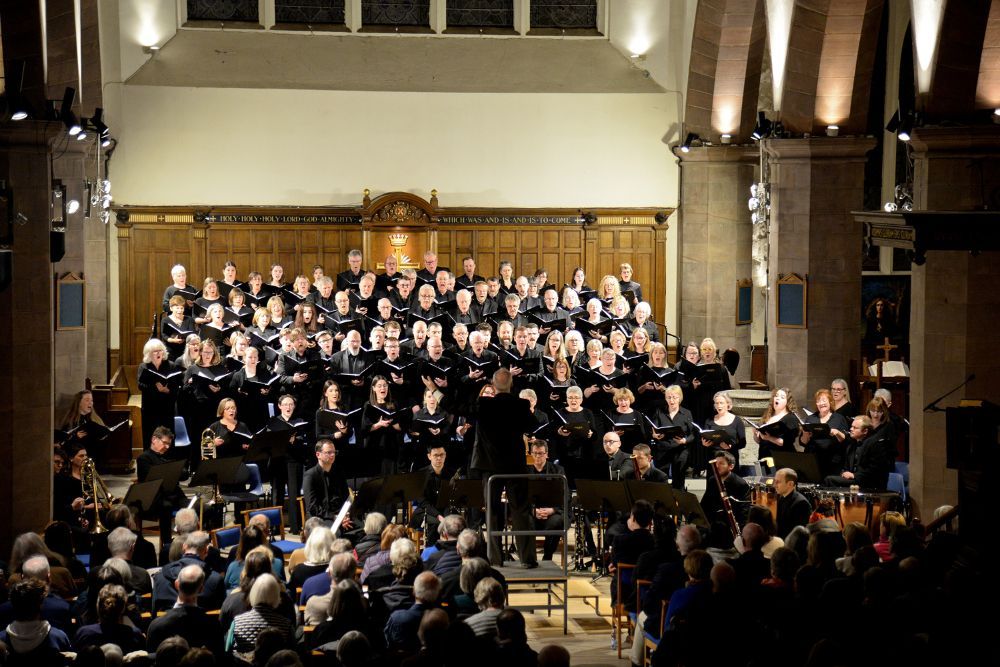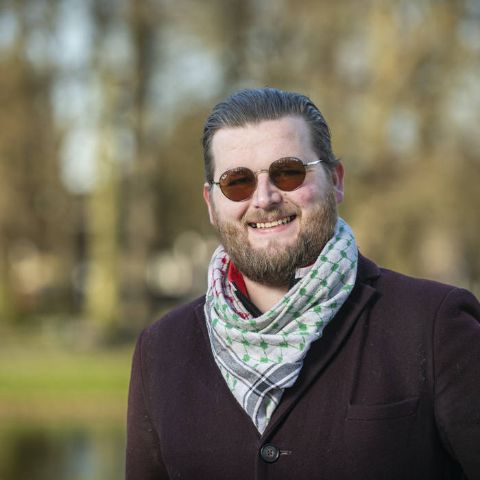Within Scotland’s current cultural climate, awash with uncertainty and instability, it is particularly heartening to see a stalwart institution like the RSNO Chorus has not only reached its 180th anniversary, but by all measures seems destined to go on for many years to come.

In September, I had the pleasure to sit down with Stephen Doughty, the director of the RSNO Chorus, to talk about his experience leading up to his third season with the ensemble. We talked about his plans for the year ahead, his own aspirations in the role, and also looked at the variety of additional choruses under the RSNO banner and the wonderful work they do.
I first ask Stephen about the history of the RSNO Chorus. “It’s a history which I’m very proud of,” he says. “The orchestra essentially came into being because of the chorus.” Doughty tells me how in the 1890s the then Glasgow Choral Union wanted to perform the Messiah with an orchestra. This led to the birth of the then-named Scottish Orchestra, and the two were parallel organisations for a long period. In the 1950s the orchestra formally became the Scottish National Orchestra, and the chorus in turn was named the Scottish National Chorus, and finally after attaining royal patronage, became the Royal Scottish National Orchestra and the RSNO Chorus from 1991.
Looking ahead, I asked about the Chorus’ plans for the coming season and what Stephen was particularly excited about. “Our musical plans are many and varied, as you say, which is always a delight and a challenge of the job. The opening concert of the season, which is happening on the 4th and 5th of October, is a performance of Mahler’s majestic Second Symphony”
Another equally giant occasion for the Chorus is November’s performance of Orff’s Carmina Burana, alongside a new work by Elena Langer: The Dong with a Luminous Nose, inspired by the Edward Lear poem. Then on 2nd January comes a timely performance of Handel’s Messiah, making a great return to what started the partnership between the Chorus and Orchestra.
The Chorus’ performances are not just tied to the orchestra. In Spring 2025 the Chorus performs in Greyfriars Kirk, Edinburgh, and then again in Paisley Abbey, bringing an all-American programme including Bernstein’s Chichester Psalms and Charles Ives’ Psalm 90.
Prior to our conversation, while investigating some of the events coming up, I was particularly intrigued by the Scottish premiere of Jonathan Dove’s stage work Uprising. The performance will muster the forces of the RSNO Chorus, the RSNO Chorus Academy and the RSNO Youth Chorus, with the work exploring many themes which preoccupy artists today: the environmental crisis, oppression, and how we fight against it. The scale of this project makes it an impressive undertaking given the size of the score alone, let alone managing the multiple musical groups involved.
We go on to talk about all the choral ensembles under the RSNO banner. These include the RSNO Chorus Academies in Glasgow and Dundee, RSNO Youth Chorus, RSNO Workplace Choir, and the RSNO Buggy Choir, all of which provide a variety of musical forums catering to the experience and skills of the group at hand. What is particularly exciting about this work is the Chorus are not just looking to their sustainability as an ensemble, but with the expansion into Dundee are looking to create musical opportunities across Scotland.
I asked Stephen about how he feels about the growth of this choral offering, and how connected they are with each other. He instantly points to the Christmas events wherein the RSNO Chorus Academies of Glasgow and Dundee, RSNO Chorus, and the RSNO Youth Chorus take to the stage together.
“It’s tremendous to join together as a community through music, whether it be the community of high-level concerts, or just coming together for a midweek sing. That’s the main draw of all these chorus academies in particular… There’s always this desire for people to join together to sing – and having the umbrella of the RSNO over the top gives everything a lovely official stamp of approval, that we’re associated and involved with the RSNO. I think it’s quite a good thing”
Stephen notes the incredible work that Patrick Barrett, Aimee Toshney, Laura McFall, and the RSNO Engagement team do in running these groups.
I then ask Stephen about the societal contributions the RSNO Chorus, and all the ensembles under its wings, can make and what vision they have for it. He highlights how the social element of choruses and making music have many positive connotations for people’s mental health, mentioning how the demand for the RSNO Chorus to do more is what led to the creation of the other ensembles. He notes how the RSNO Chorus Academy in Glasgow is quite well-established, and that the demand in Dundee is so great that the ensemble is already over-subscribed.
We also wander into our shared experience in brass banding, and how it can be a wonderful avenue into music-making, especially in working class communities. But we both pointed to how the strength of the RSNO Chorus family is thanks to its multiple layers within its range of groups – which offer not only initial access, but a continuing avenue to fall in love with music, and to have increasingly varied and more demanding music-making experiences.
These developments, together with bigger and bolder musical plans – such as an upcoming international concert in the near future – are not the only ways the Chorus is building itself upwards. One extremely positive development is the reinstatement of the Sir Alexander Gibson Memorial Fellowship, which sees a lucky conductor adopted by the chorus, taken under the ensemble’s wing to learn more about the craft of working with large choral repertoire. This combined with mentoring from Stephen will allow the conductor to not only grow as an artist but also as a professional. At the time of writing the award recipient has not yet been announced, but given the support offered, I am sure they’ll thrive. It is also particularly heartening that the fellowship will be mentored by Stephen Doughty – one of the early recipients of the award when it was first introduced.
“We’re very excited about it,” Doughty says, “because that’s how I started. I still remember to this day things that Christopher Bell suggested when he mentored me, all the tips he offered: Do this, don’t do that. Why are you doing this? It’s great to be able to take whatever knowledge I have and to be able to pass that on to somebody else coming up. Working with the chorus is very friendly, but the end of the day we have a job to do. To focus the conductor’s thoughts and energies on aiming towards the end product, which is never very far away – it’s kind of a skill in itself. It’s great to be able to offer that opportunity to somebody else.”
The last port of call in our discussion was the RSNO Chorus’ appeal Sing Your Part. The campaign is to help make singing more readily available throughout Scotland. (As can be seen by the sheer variety of groups the RSNO Chorus runs, they do mean business!) However, to be able to make this work grow, money needs to be raised, and the annual cost of running the groups amounts to around £1 million currently – so donations are vitally important. You can find out more about the Sing Your Part campaign at the bottom of this article.
In talking to Stephen, what captures me most is his infectious enthusiasm. This passion is not limited to his “serious” work, but it is in everything we talked about, from the youth choruses, the RSNO Chorus Academy, the RSNO Chorus, to our mutual dreams of being better euphonium players. Stephen is deeply passionate and simply eager for there to be more music available. With such an individual at the forefront, accompanied by an equally bold and daring team of conductors in the other facets of the RSNO Chorus family the future looks extremely bright. So, on that note, many happy returns to the RSNO Chorus – and here’s to another 180 years!
For more information about the Sing Your Part campaign follow this link.
See listings of upcoming performances by the RSNO Chorus.
This article was sponsored by the Royal Scottish National Orchestra.


